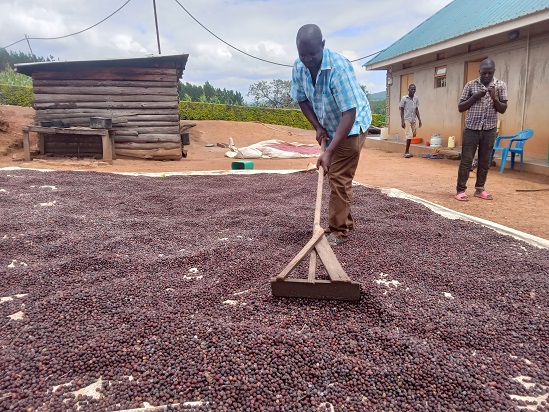By Business Express Reporter
Uganda’s coffee sector has received a much-needed boost as prices on both the domestic and international markets begin to rebound after months of decline. The recovery is most visible for Robusta beans, Uganda’s leading export variety, which had earlier suffered a steep fall due to oversupply and favorable weather conditions in major coffee-producing countries.
In recent months, the average farm-gate price of Robusta coffee dropped from Shs13,000 per kilogram of Fair Average Quality (FAQ)/Kasse to as low as Shs9,000, leaving many farmers frustrated. Prices for Kiboko (dry coffee cherries) also slipped from around Shs7,000 to Shs5,000, worsening the earnings gap for smallholder farmers.
Now, however, the tide is turning. According to the latest market report from the Ministry of Agriculture, Animal Industry and Fisheries (MAAIF), prices have bounced back significantly. Robusta FAQ is currently trading between Shs13,000–14,000 per kilogram, while Arabica parchment is fetching Shs13,500–14,000.
“This rebound reflects the resilience of our farmers, as well as the confidence international buyers continue to have in Uganda’s high-quality coffee,” said Hon. Frank K. Tumwebaze, Minister of Agriculture, Animal Industry and Fisheries.
Global Factors Driving the Rebound
International reports attribute the price recovery to several bullish fundamentals. These include a recent frost event in Brazil—the world’s largest coffee producer—reduced Brazilian exports, and falling inventories in ICE-certified warehouses. Together, these factors have tightened global supply, pushing prices upwards.
Earlier in June 2025, Minister Tumwebaze had cautioned farmers about the temporary downturn, attributing it to global imbalances in demand and supply, coupled with oversupply from Brazil, Vietnam, and India. At that time, he assured Ugandans that MAAIF was working with stakeholders to stabilize the sector and predicted a price rebound by mid-August 2025.
“I am pleased to confirm that this prediction has come true. Coffee prices have indeed recovered to the levels we had anticipated,” Tumwebaze said.
Focus on Quality and Value Addition
While welcoming the rebound, the Minister urged farmers and stakeholders across the coffee value chain to maintain strict quality standards to protect Uganda’s reputation as a reliable producer of premium coffee.
He called on farmers to adopt good agricultural practices (GAPs) such as proper harvesting, careful drying, and improved post-harvest handling. He also emphasized the importance of strengthening farmer organizations and cooperatives to enhance bargaining power and improve access to better markets.
“Uganda’s coffee must continue to compete not just on volume, but also on quality. That is the only way to secure sustainable markets and premium prices in the long run,” Tumwebaze said.
The Minister also highlighted the need to explore value addition—such as roasting, packaging, and branding—so that Uganda can benefit more from the global coffee trade rather than relying solely on the export of raw beans. Value-added coffee products, he noted, would cushion farmers and exporters from the volatility of international price shifts.
Government Commitment
The government reaffirmed its commitment to supporting coffee farmers and ensuring that the crop remains a cornerstone of Uganda’s economy. Coffee continues to be the country’s largest agricultural export, employing millions of households and contributing significantly to foreign exchange earnings.
“The Ministry of Agriculture, Animal Industry and Fisheries will continue to protect the interests of coffee farmers and provide technical guidance and support to ensure Uganda’s coffee sector thrives,” Tumwebaze said.
He added:
“We must maintain momentum and ensure that all stakeholders—from farmers to exporters—adhere to best practices at every stage of production. This is not just about securing good prices today, but about safeguarding Uganda’s future as a global coffee powerhouse.”




